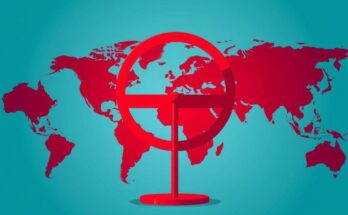Following violent electoral conflicts in Mozambique in October 2024 resulting in numerous fatalities, approximately 13,000 Mozambicans fled to Malawi. While efforts for voluntary repatriation are being initiated, concerns about safety, economic instability, and lost properties deter many refugees from returning home despite necessary assurances from the Mozambican government.
The recent violence surrounding Mozambique’s controversial election in October 2024 has tragically resulted in approximately 300 deaths and prompted around 13,000 individuals to seek refuge in southern Malawi. As officials begin the process of repatriation, concerns regarding the safety and stability of returning home linger amongst the Mozambican refugees.
The tensions escalated after Daniel Chapo of the ruling Frelimo party assumed leadership from outgoing President Filipe Nyusi, who was constitutionally barred from seeking re-election. Opposition leader Venancio Mondlane accused the government of electoral fraud, leading to widespread protests that intensified after Mozambique’s Constitutional Council confirmed Chapo’s win, solidifying Frelimo’s longstanding political dominance. The vast majority of those fleeing sought safety in the Nsanje district of southern Malawi, traversing perilous routes filled with natural hazards.
Upon arrival, many Mozambicans found themselves in displacement camps with scant access to basic resources like food and medicine. Malawi is already grappling with over 50,000 refugees from other nations, compounded by challenges like poor harvests linked to the El Niño phenomenon and heightened disease risks during the rainy season.
Human rights activist Moses Mukandawire emphasized the importance of ensuring peace in Mozambique and noted that voluntary repatriation is vital for those needing to tend to agricultural responsibilities in their homeland. He expressed concerns regarding the assurances made by the Mozambican government about the safety of returnees, urging for a fact-finding mission to verify these commitments.
Nonetheless, many refugees face profound challenges, having lost livelihoods, property, and even family members. Their willingness to return hinges on credible assurances of safety and stability in Mozambique. Additionally, the ongoing insecurity and stagnant economic conditions in Mozambique continue to loom over their potential repatriation. Economist Teresa Boene pointed out the urgent need for economic recovery, which has been severely hampered by post-election unrest that led to the closure of numerous businesses and extensive infrastructure damage, severely impacting the nation’s economy.
The situation for Mozambicans in Malawi remains precarious, driven by the aftermath of political violence and socioeconomic instability in Mozambique. Efforts are underway to facilitate voluntary repatriation, yet concerns about safety and economic sustainability continue to pose significant challenges. Without assurances of relative peace and a stable environment, many refugees may remain hesitant to return home, fearing an uncertain future.
Original Source: www.dw.com




